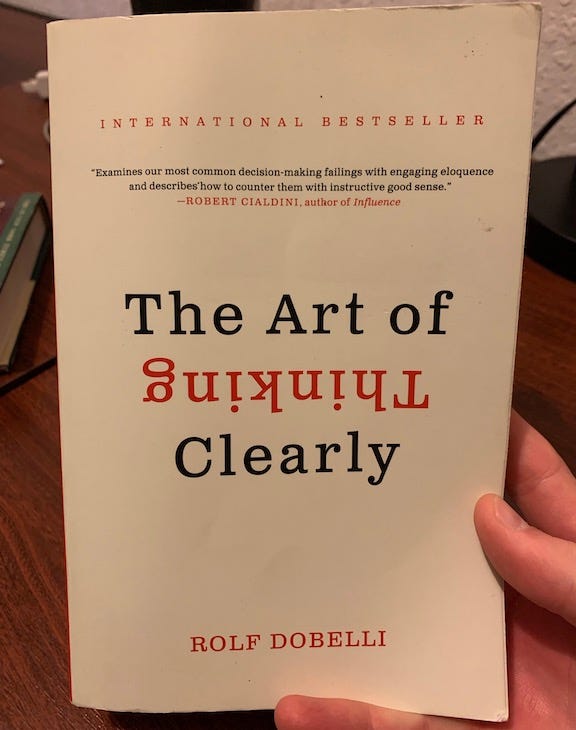The Art of Thinking Clearly by Rolf Dobelli

My good friend Mohamad Eleter recommended this book to me and I thought that it was filled with amazing insights. Learning more about the thinking process is something that I always enjoy and I know that people all think differently. It’s extremely valuable to me that I understand the things that may impact my thinking positively or negatively and this book expanded my horizons in many ways.
Books that compile information upon information upon information are books that I greatly enjoy. I love when all the information is already sifted through and easily digestible. Learning from others is something I always enjoy doing and I think that this book was one of the best resources that I studied this year. The author kicked off the book in the best way.
Introduction:
Pg. xviii, In writing this book, I think of myself as a translator whose job is to interpret and synthesize what I’ve read and learned — to put it in terms others can understand. My great respect goes to the researchers who, in recent decades, have uncovered these behavioral and cognitive errors. The success of this book is fundamentally a tribute to them.
This chapter was one that I had learned about previously but not much about it in relation to happiness and general emotions. I find it incredibly valuable to continue to reflect upon the various emotions that I experience and strive to understand the sources or influences of them.
Chapter 2, Does Harvard Make You Smarter? Swimmer’s Body Illusion
Pg. 6, Cheerfulness, according to many studies, such as those conducted by Harvard’s Dan Gilbert — is largely a personality trait that remains constant throughout life. Or, as social scientists David Lykken and Auke Tellegen starkly suggest, “trying to be happier is as futile as trying to be taller.”
People I follow have been talking a lot recently about changing your mind and how it’s a strength. There is no need or reason or benefit to seeing a project through to the end if the investment is going to continue to decline and you will get nothing out of it.
Chapter 5, Why You Should Forget the Past. Sunk Cost Fallacy
Pg. 14, The more we invest, the greater the sunk costs are, and the greater the urge to continue becomes. This irrational behavior is driven by a need for consistency. After all, consistency signifies credibility. We find contradictions abominable. If we decide to cancel a project halfway through, we create a contradiction: We admit that we once thought differently. Carrying on with a meaningless project delay this painful realization and keeps up appearances.
I find that this is essential for everyone. If we take no time to truly look at the reasons behind our beliefs and values, we are simply reinforcing confirmation bias. It is imperative that we understand the reasons we believe certain things that we do and also understand what other people who may be in opposition to what we believe. I see confirmation bias in play in casual conversations nearly every day, but if you’re never aware of it, you will not recognize it.
Chapter 8, Murder Your Darlings. Confirmation Bias
Pg. 24, To fight against the confirmation bias, try writing down your beliefs — whether in terms of worldview, investments, marriage, health care, diet, career strategies — and set out to find disconfirming evidence. Axing beliefs that feel like old friends is hard work but imperative.

I started doing this with a prayer journal and have documented the things that I have prayed about and then referenced them further later on. The book, “Superforecasting” (linked here) examines and displays that people are wildly inaccurate with their predictions. I believe that it’s essential to understand and document what we believe in the moment before the event, our subconscious mind is known to misconstrue history.
Chapter 14, Why You Should Keep a Diary. Hindsight Bias
Pg. 42, Keep a journal. Write down your predictions — for political changes, your career, your weight, the stock market, and so on. Then, from time to time, compare your notes with your actual developments. You will be amazed at what a poor forecaster you are. Don’t forget to read history, too — not the retrospective, compacted theories compiled in textbooks, but the diaries, oral histories, and historical documents from the period. If you can’t live without news, read newspapers from five, ten, or twenty years ago. This will give you a much better sense of just how unpredictable the world is. Hindsight may provide temporary comfort to those overwhelmed by complexity, but as for providing deeper revelations about how the world works, you’ll benefit by looking elsewhere.

Love this. I highlighted it because I agree completely. We need to be in front of the decision makers and listen to them and get past everyone else. Some people just, as the author says, generate clichés. I laugh when people take everything that is broadcasted seriously. Those people are not experts on all the subjects they are discussing — they could not be… if they were experts, wouldn’t it make much more sense for them to do something other than share surface-level information? Probably. I love that the author shared that the experts are truly aware of their limits, I agree.
Chapter 16, Don’t Take News Anchors Seriously, Chauffeur Knowledge
Pg. 48, Be on the lookout for chauffeur knowledge. Do not confuse the company spokesperson, the ringmaster, the newscaster, the schmoozer, the verbiage vendor, or the cliché generator with those who possess true knowledge. How do you recognize the difference? There is a clear indicator: True experts recognize the limits of what they know and what they do not know.
I think that this is something people far too often overlook. It’s essential that we understand what the norms are so that we are not caught off-guard during up or down years. This is one of the things that has made Warren Buffett so incredibly successful over the course of his investing career. He’s always been aware of what the means are and what is to be expected and knows that there will be changes over time but eventually, if all things remain constant, everything will return to the status quo.
Chapter 19, The Dubious Efficacy of Doctors, Consultants, and Psychotherapists, Regression to Mean
Pg. 56, You can appreciate why some athletes would rather not make it on to the front pages of the newspapers: Subconsciously they know that the next time they race, they probably won’t achieve the same top result — which has nothing to do with the media attention, but with natural variations in performance.
Pg. 57, When you hear stories such as: “I was sick, went to the doctor, and got better a few days later” or “the company had a bad year, so we got a consultant in, and now the results are back to normal,” look out for our old friend, the regression-to-mean error.

People spend so much time nowadays choosing outfits and picking out clothes. Why do people have a closet full of 50 different tops and exclaim that they have no clothes? Too. Many Choices.
Chapter 21, Less is More, Paradox of Choice
Pg. 62, In his book “The Paradox of Choice” psychologist Barry Schwartz describes how a surfeit of choices destroys the quality of life. First, a large selection leads to inner paralysis. To test this, a supermarket set up a stand where customers could sample twenty-four varieties of jelly. They could try as many as they liked and then buy them at a discount. The next day, the owners carried out the same experiment with only six flavors. The result? They sold ten times more jelly on day two. Why? With such a wide range, customers could not come to a decision, so they bought nothing. The experiment was repeated several times with different products. The results were always the same.
In other books, and as David Burkus shares also, it’s essential that the devil’s advocate is not always the same person. If the person is always the same, people will target that person and work against them. It’s important that people do not always agree. I forget if it was Steve Jobs or Jeff Bezos but if everyone agreed in a meeting, they would call off the meeting and wait until another date to have it again.
Chapter 25, The Calamity of Conformity, Groupthink
Pg. 75, If you ever find yourself in a tight, unanimous group, you must speak your mind, even if your team does not like it. Question tacit assumptions, even if you risk expulsion from the warm nest. And, if you lead a group, appoint someone as devil’s advocate. She will not be the most popular member of the team, but she might be the most important.
This is something that is talked about time and time and time again. Just ask around what people’s life insurance policies are and you will have a better understanding of this in action.
Chapter 26, Why You’ll Soon Be Playing Mega Trillions, Neglect of Probability
Pg. 77, We respond to the magnitude of an event (the size of the jackpot or the amount of electricity), but not to its likelihood. In other words: We lack an intuitive grasp of probability.
The proper term for this is neglect of probability, and it leads to errors in decision making. We invest in start-ups because the potential profit makes dollar signs flash before our eyes, but we forget (or are too lazy) to investigate the slim chances of new businesses actually achieving such growth. Similarly, following extensive media coverage of a plane crash, we cancel flights without really considering the minuscule probability of crashing (which of course remains the same before and after such a disaster).
Pg. 79, Two researchers at the University of Chicago have shown that people are equally afraid of a 99 percent change as they are of a 1 percent chance of contamination by toxic chemicals. An irrational response, but a common one.

Crazy. Hotels use various services and offer them a limited amount of rooms so they can all use the “only 5 rooms left!” sell for consumers. More rooms sell when people think that there are fewer hotel rooms remaining. But this is a totally preposterous reaction; things do not have a greater value if they are less accessible or available.
Chapter 27, Why the Last Cookie in the Jar Makes Your Mouth Water, Scarcity Error
Pg. 82, When we are deprived of an option, we suddenly deem it more attractive. It is kind of an act of defiance. It is also known as the “Romeo and Juliet effect”: Because the love between the tragic Shakespearean teenagers is forbidden, it knows no bounds. This yearning must not necessarily be in a romantic way. In the United States, student parties are often littered with desperately drunk teenagers. In Europe, where the age limit is eighteen, you don’t witness this type of behavior.
In conclusion: The typical response to scarcity is a lapse in clear thinking. Assess products and services solely on the basis of their price and benefits. It should be of no importance if an item is disappearing fast or if any doctors from London take an interest.
There are numerous numerous books out there about anchors. One of my favorites is “Pitch Anything” by Oren Klaff. He talks about all the different ways that we can frame things and how anchors can and should be used. There are people that say contradicting things in some ways — some people say that in a job interview the applicant should first state a salary request and others say that the possible employer should state the salary offer first. It all depends on who is going to provide the anchor.
Chapter 30, Why the Wheel of Fortune Makes Our Heads Spin, The Anchor
Pg. 91, The more uncertain the value of something — such as real estate, company stock, or art — the more susceptible even experts are to anchors.
It’s easy to rely upon others when we think we won’t be held accountable for certain things. However, if we are going to be held accountable — and even potentially rewarded — we likely will work harder and do better.
Chapter 33, Why Teams Are Lazy, Social Loafing
Pg. 100, In conclusion: People behave differently in groups than when alone (otherwise there would be no groups). The disadvantages of groups can be mitigated by making individual performances as visible as possible. Long live meritocracy! Long live the performance society!

Warren Buffett’s wealth is a great example of this. So is the value of Amazon. Also is the development of technology. Vehicles are a great example of this. Just over 100 years ago, cars didn’t go faster than 20 mile per hour. Today, cars are becoming fully electric in a sustainable way.
Chapter 34, Stumped by a Sheet of Paper, Exponential Growth
Pg. 103, The ancient Persians were well aware that people struggled with percentage growth. Here is a local tale: There was once a wise courtier who presented the king with a chessboard. Moved by the gift, the king said to him: “Tell me how I can thank you.” “Your highness, I want nothing more than for you to cover the chessboard with rice, putting one grain of rice on the first square, and then on every subsequent square, twice the previous number of grains.” The king was astonished: “It is an honor to you, dear courtier, that you present such a modest request.” But how much rice is that? The king guessed about a sack. Only when his servants began the task — placing a grain on the first square, two grains of rice on the second square, four grains of rice on the third, and so on — did he realize that he would need more rice than was growing on earth.
The book I’d recommend here is also Oren Klaff’s “Pitch Anything” that focuses on framing in-depth. Easily one of the most impactful books to me and one I should revisit again shortly. And as I write this, I now re-downloaded the book on the Audible app for reviewing.
Chapter 42, It’s Not What You Say, but How You Say It, Framing
Pg. 125, Consider these two statements:
“Hey, the trash can is full!”
“It would be really great if you could empty the trash, honey.”
C’est le ton qui fait la musique: it’s not what you say but how you say it. If a message is communicated in different ways, it will also be received in different ways. In psychologists’ jargon, this technique is called framing.
Pg. 127, In conclusion: Realize that whatever you communicate contains some element of framing, and that every fact — even if you hear it from a trusted friend or read it in a reputable newspaper — is subject to this effect, too. Even this chapter.
I find that people do not truly think through the consequences of various things enough before wishing, asking, or even working towards something that they think they want. What will happen when you get a raise? Will you really become happier or more fulfilled? Probably not.
Chapter 46, Be Careful What You Wish For, Hedonic Treadmill
Pg. 138, People who change or progress in their careers are, in terms of happiness, right back where they started after around three months. The same goes for people who buy the latest Porsche. Science calls this effect the hedonic treadmill: We work hard, advance, and are able to afford more and nicer things, and yet this doesn’t make us any happier.
I love love love this idea. It’s important that our staff doesn’t feel the need to butter things up. And better yet, if you have bad news, come also with a solution to solve it.
Chapter 48, Why Experience Can Damage Your Judgment, Association Bias
Pg. 144, If you lead a group of people, and don’t want to fall prey to false connections, direct your staff to tell you only the bad news — and fast. With this, you overcompensate for the shoot-the-messenger syndrome and, believe me, you will still hear enough positive news.
Pg. 145, The take-home message from all this is phrased most aptly by Mark Twain: “We should be careful to get out of an experience only the wisdom that is in it — and stop there; lest we be like the cat that sits down on a hot stove lid. She will never sit down on a hot stove lid again — and that is well; but also she will never sit down on a cold one anymore.”

I’ve used this many many times and shared it with a multitude of people. I’ve used this technique at the grocery store, theme parks, the airport, basically everywhere I can. I want to do the research for myself. And beyond that, people want to help others so framing requests in this way gives people an opportunity to help others — even if they’re helping you.
Chapter 52, Any Lame Excuse, “Because” Justification
Pg. 155, In the 1970s, Harvard psychologist Ellen Langer conducted an experiment. For this, she went into a library and waited at a photocopier until a line had formed. Then she approached the first in line and said: “Excuse me, I have five pages. May I use the Xerox machine?” Her success rate was 60 percent. She repeated the experiment, this time giving a reason: “Excuse me. I have five pages. May I use the Xerox machine because I’m in a rush?” In almost all cases (94 percent), she was allowed to go ahead. This is understandable: If people are in a hurry, you often let them cut in to the front of the line. She tried yet another approach, this time saying: “Excuse me. I have five pages. May I go before you because I have to make some copies?” The result was amazing: Even though the pretext was (a-hem) paper-thin — after all, everyone was standing in line to make copies — she was allowed to pass to the front of the line in almost all cases (93 percent).
Pg. 157, Never leave home without “because.” This unassuming little word greases the wheels of human interaction. Use it unrestrainedly.
This is just one reason that many of the most successful people in the world operate with a very disciplined schedule in their first and last hours of the day. I wake up and for the first 60–90 minutes, I know exactly what I’m doing. Before bed, for the last 40–60 minutes, I know exactly what I am doing leading up to my bedtime. As a result, there are up to 3 hours of my day that have minimal decisions.
Chapter 53, Decide Better — Decide Less, Decision Fatigue
Pg. 160, A study of hundreds of verdicts shows that within a session, the percentage of “courageous” judicial decisions gradually drops from 65 percent to almost zero, and after a recess, returns to 65 percent.
This was one of my favorite chapters from the entire book. Whenever someone shares an average with me, I just want to see the data. I don’t care about the averages, show me the data. The Bill and Melinda Gates had an oversight with one of their investments in the education field. They invested in private schools because they had the highest-ranking schools in the United States. However, they also had the lowest-ranking schools in the United States.
Chapter 55, Why There Is No Such Thing as an Average War, The Problem with Averages
Pg. 164, “Don’t cross a river if it is (on average) four feet deep,” warns Nassim Taleb. The river can be very shallow for long stretches — mere inches — but it might transform into a raging torrent that is twenty feet deep in the middle — in which case you could easily drown. Dealing in averages is a risky undertaking because they often mask the underlying distribution — the way the values stack up.
Pg. 166, In conclusion: If someone uses the word “average,” think twice. Try to work out the underlying distribution. If a single anomaly has almost no influence on the set, the concept is still worthwhile. However, when extreme cases dominate (such as the Bill Gates phenomenon), we should discount the term “average.” We should all take stock from novelist William Gibson: “The future is already here — it’s just not very evenly distributed.”
Surprisingly to me, this is something that far too many people still do not understand or put into practice. It’s not enough to hand someone a large paycheck or bonus and expect that they will remain motivated and innovative throughout their time in a company or organization unless they are really drawn to the work that they are doing.
Chapter 56, How Bonuses Destroy Motivation, Motivation Crowding
Pg. 168, Science has a name for this phenomenon: motivation crowding. When people do something for well-meaning, nonmonetary reasons — out of the goodness of their hearts, so to speak — payments throw a wrench into the works. Financial reward erodes any other motivations.
Pg. 169, So who is safe from motivation crowding? This tip should help: Do you know any private bankers, insurance agents, or financial auditors who do their job out of passion or believe in a higher mission? I don’t. Financial incentives and performance bonuses work well in industries with generally uninspiring jobs — industries where employees aren’t proud of the products or the companies and do the work simply because they get a paycheck. On the other hand, if you create a start-up, you would be wise to enlist employee enthusiasm to promote the company’s endeavor rather than try to entice employees with juicy bonuses, which you couldn’t pay anyway.
I’m guilty of this. I like working hard and often, once I’m all in on something, I like to see it through to the end. This, at least for me, connects with the sunk cost fallacy that the author talked about earlier.

Chapter 60, Hurts So Good, Effort Justification
Pg. 181, Now that you know about effort justification, you can rate your projects more objectively. Try it out: Whenever you have invested a lot of time and effort into something, stand back and examine the result — only the result.
The novel you’ve been tinkering with for five years and that no publisher wants: Perhaps it’s not Nobel-worthy after all.
The MBA you felt compelled to do: Would you really recommend it?
And the woman you’ve been chasing for years: Is she really better than bachelorette number two who would say yes right away?
I laughed when I read that the author included anthills in this. If we think about people succumbing to this type of thing, I am confident that we could all think about a specific situation where this has been apparent and evident in our lives.
Chapter 61, Why Small Things Loom Large, The Law of Small Numbers
Pg. 184, So, watch out when you hear remarkable statistics about any small entities: businesses, households, cities, data centers, anthills, parishes, schools, and so on. What is being peddled as an astounding finding is, in fact, a humdrum consequence of random distribution. In his latest book, Nobel Prize winner Daniel Kahneman reveals that even experienced scientists succumb to the law of small numbers. How reassuring.
Below are three questions from the author. I answered the questions myself and then with a handful of other people also, I wanted to see how I would do and then also sought to see how other people think and would respond. These were great and things that I had heard about before but I loved what the chapter had to say. Best of luck!
Chapter 63, Speed Traps Ahead! Simple Logic
Pg. 188, Three easy questions. Grab a pen quickly and jot down your answers.
First question: In a department store, a Ping-Pong paddle and a plastic ball cost $1.10. If the paddle costs $1 more, how much is the ball?
Second question: In a textile factory, five machines take exactly five minutes to make five shirts. How many minutes will it take one hundred machines to produce one hundred shirts?
And, the third question: A pond has water lilies growing in it. The flowers multiply quickly, each day doubling the area they take up. If it takes forty-eight days for the pond to be completely covered with water lilies, how many days will it take for it to be half covered?
Don’t read on until you have written down the answers.
For each of these questions, there is an intuitive answer — and a right one. The quick, intuitive answers come to mind first: ten cents, one hundred minutes, and twenty-four days. But these are all wrong. The solutions are: five cents, five minutes, and forty-seven days. How many did you answer correctly?
Pg. 190, Not everything that seems plausible is true. Reject the easy answers that pop into your head. So, one more try: You are traveling from A to B. On the way there you drive at 100 mph and on the way back, at 50 mph. What was your average speed? 75 mph? Slow down, slow down!

The book shared an example of a photographer who made $300 an hour and had the opportunity to build a birdhouse. It was expected to take a skilled carpenter 6 hours or it would take the photographer 12 hours. Well, the photographer could easily hire a carpenter for the cost of what he makes in one hour of work as a photographer, so that is what they should do. What this does not take into account, though, is the impact that volunteering has on our own hearts and lives. Volunteering is often more impactful for us as it is for the organization or group that we are volunteering for.
Chapter 65, Volunteer Work Is for the Birds, Volunteer’s Folly
Pg. 196, If people don’t double-take when they pass you on the street, the best way to contribute is with green-backs rather than greenhorn labor.
Love this, believe this, live this. That’s all. Smile more — that’s my takeaway.
Chapter 66, Why You Are a Slave to Your Emotions, Affect Heuristic
Pg. 199, Whether we like it or not, we are puppets of our emotions. We make complex decisions by consulting our feelings, not our thoughts. Against our best intentions, we substitute the question, “What do I think about this?” with “How do I feel about this?” So, smile! Your future depends on it.
I would presume we are all guilty of some of the following things. We might respond in a way that is completely off center. Often, people are not going to agree with us or think that we are right, so what? We had better understand exactly what our response is and why. We may believe that the other person is ignorant, idiotic, or malicious — and often that is not true at all.
Chapter 67, Be Your Own Heretic, Introspection Illusion
Pg. 201, The belief that reflection to truth or accuracy is called the introspection illusion. This is more than sophistry. Because we are so confident of our beliefs, we experience three reactions when someone fails to share our views.
Response 1: Assumption of ignorance. The other party clearly lacks the necessary information. If he knew what you know, he would be of the same opinion. Political activists think this way: They believe they can win others over through enlightenment.
Response 2: Assumption of idiocy. The other person has the necessary information, but his mind is underdeveloped. He cannot draw the obvious conclusions. In other words, he’s a moron. This reaction is particularly popular with bureaucrats who want to protect “stupid” consumers from themselves.
Response 3: Assumption of malice. Your counterpart has the necessary information — he even understands the debate — but he is deliberately confrontational. He has evil intentions. This is how religious leaders and followers treat disbelievers: If they don’t agree, they must be servants of the devil!
Could this be one of the contributing factors to the divorce rate in the United States? I’d believe so. I wrote in my margins that burning our ships is like what Warren Buffett says, “The difference between successful people and really successful people is that really successful people say no to almost everything.”
Chapter 68, Why You Should Set Fire to Your Ships, Inability to Close Doors
Pg. 205, We are obsessed with having as many irons as possible in the fire, ruling nothing out, and being open to everything. However, this can easily destroy success. We must learn to close doors. A business strategy is primarily a statement on what not to engage in. Adopt a life strategy similar to a corporate strategy: Write down what not to pursue in your life. In other words, make calculated decisions to disregard certain possibilities and when an option shows up, test it against your not-to-pursue list. It will only keep you from trouble but also save you lots of thinking time. Think hard once and then just consult your list instead of having to make up your mind whenever a new door cracks open. Most doors are not worth entering, even when the handle seems to turn so effortlessly.
Wow oh wow isn’t our subconscious mind powerful. And this is just one more reason that we need to be extremely aware of what we are feeding to the subconscious mind — it doesn’t have a filter, it receives and retains all information.
Chapter 70, Why Propaganda Works, Sleeper Effect
Pg. 210, Amazingly, just the opposite is true for propaganda. If it strikes a chord with someone, this influence will only increase over time. In other words, your brain quickly forgets where the information came from. Meanwhile, the message itself fades only slowly or even endures. Therefore, any knowledge that stems from an untrustworthy source gains credibility over time. The discrediting force melts away faster than the message does.

I wrote in the margins that there is ALWAYS another way. Making a pro and con list is not the best way to go. By looking at solely the pros and cons, you are in essence overlooking all other possible options that you would be missing out on, hence: alternative blindness.
Chapter 71, Why It’s Never Just a Two-Horse Race, Alternative Blindness
Pg. 213, This is how top investor Warren Buffet does things: “Each deal we measure against the second-best deal that is available at any given time — even if it means doing more of what we are already doing”
Unlike Warren Buffett, politicians often fall victim to alternative blindness. Let’s say your city is planning to build a sports arena on a vacant plot of land. Supporters argue that such an arena would benefit the population much more than an empty lot — both emotionally and financially. But this comparison is wrong. They should compare the construction of the sports arena with all other ideas that become impossible due to its construction — for example, building a school, a performing arts center, a hospital, or an incinerator. They could also sell the land and invest the proceeds or reduce the city’s debt.
This is particularly interesting to me. I strive to do the same thing that the author recommends and pay attention to my impression of someone at various points of an interaction and not just during the beginning or end — as I wrote earlier, our mind has a way of misconstruing things.
Chapter 72, Why First Impressions Are Deceiving, Primacy and Recency Effects
Pg. 218, Allow me to introduce you to two men, Alan and Ben. Without thinking about it too long, decide whom you prefer. Alan is smart, hardworking, impulsive, critical, stubborn, and jealous. Ben, however, is jealous, stubborn, critical, impulsive, hardworking, and smart. Who would you prefer to get stuck with in an elevator? Most people choose Alan, even though the descriptions are exactly the same. Your brain pays more attention to the first adjectives in the lists, causing you to identify two different personalities. Alan is smart and hardworking. Ben is jealous and stubborn. The first traits outshine the rest. This is called the primacy effect.
Pg. 220, Try to avoid evaluations based on first impressions. They will deceive you, guaranteed, in one way or another. Try to assess all aspects impartially. It’s not easy, but there are ways around it. For example, in interviews, I jot down a score every five minutes and calculate the average afterward. This way, I make sure that the “middle” counts just as much as hello and good-bye.
I’ve seen this in action and it is a very very difficult thing for people to overcome. The author talked about a sauce recipe he made for him and his wife. He loved it and his wife thought it was horrendous. Later on, his wife made the recipe for him and he thought that it was terrible, unbeknownst to him, it was the same recipe he made for her previously.
Chapter 74, Why You Can’t Beat Homemade, Not-Invented-Here Syndrome
Pg. 222, When people collaborate to solve problems and then evaluate these ideas themselves, NIH syndrome will inevitably exert an influence. Thus, it makes sense to split teams into two groups. The first group generates ideas, the second rates them, and vice versa. We tend to rate our own business ideas as more successful than other people’s concepts. This self-confidence forms the basis of thriving entrepreneurship but also explains start-ups’ frequently miserable returns.
This chapter was all about another thing that I am seeing up close. People are experts in a specialized area for a reason. It is not easy to transfer knowledge from one area or position to another. We see this all the time:
The former star athlete who tries to become a coach and fails miserably.
The incredible salesman who becomes a manager and fails miserably.
The retired worker who becomes a professor and fails miserably.
It’s not easy.
Chapter 76, Knowledge is Nontransferable, Domain Dependence
Pg. 228, As an author, I realize just how difficult it is to transfer skills to a new area. For me, devising plots for my novels and creating characters are a cinch. A blank, empty page doesn’t daunt me. It’s quite a different story with, say, an empty apartment. When it comes to interior decor, I can stand in the room for hours hands in my pockets, devoid of one single idea.
Business is teeming with domain dependence. A software company recruits a successful consumer-goods salesman. The new position blunts his talents; transferring his sales skills from products to services is exceedingly difficult. Similarly, a presenter who is outstanding in front of small groups may well tank when his audience reaches one hundred people. Or a talented marketing mind may be promoted to CEO and suddenly find that he lacks any strategic creativity.
Pg. 229, What you master in one area is difficult to transfer to another. Especially daunting is one transfer from academia to real life — from the theoretically sound to the practically possible. Of course, this also counts for this book. It will be difficult to transfer the knowledge from these pages to your daily life. Even for me as the writer, that transition proves to be a tough one. Book smarts don’t transfer to street smarts easily.

I love what his wife shared with him, it’s so so true and something that I find incredibly helpful when I get trapped in comparison.
“Comparison is the root of all feelings of inferiority.” — James Dobson
Chapter 86, Build Your Own Castle, Envy
Pg. 259, When I find myself suffering pangs of envy, my wife reminds me: “It’s okay to be envious — but only of the person you aspire to become.”
SHOW ME THE DATA.
Chapter 87, Why You Prefer Novels to Statistics, Personification
Pg. 262, In conclusion: Be careful when you encounter human stories. Ask for the facts and the statistical distribution behind them. You can still be moved by the story, but this way, you can put it into the right context. If, however, you seek to move and motivate people for your own ends, make sure your tale is seasoned with names and faces.
If it’s routine, with muscle memory, go with the instinctual and intuitive response.
Chapter 90, Where’s the Off Switch? Overthinking
Pg. 271, This raises the question: When do you listen to your head and when do you heed your gut? A rule of thumb might be: If it is something to do with practiced activities, such as motor skills (think of the centipede, Van de Velde, or mastering a musical instrument) or questions you’ve answered a thousand times (think of Warren Buffett’s “circle of competence”), it’s better not to reflect to the last detail. It undermines your intuitive ability to solve problems. The same applies to decisions that our Stone Age ancestors faced — evaluating what was edible, who would make good friends, whom to trust. For such purposes, we have heuristics, mental shortcuts that are clearly superior to rational thought. With complex matters, though, such as investment decisions, sober reflection is indispensable. Evolution has not equipped us for such considerations, so logic trumps intuition.

I love this. What we know cannot be applied everywhere and oftentimes, it makes a lot more sense to bring in an expert. My Dad, for example, is great at improvising and finding solutions for things but he is not an incredible handyman. He gets the job done and often does a good job but probably in more time and less efficiently than an expert might.
Chapter 92, Those Wielding Hammers See Only Nails, Déformation Professionnelle
Pg. 275, “If your only tool is a hammer, all your problems will be nails,” — Mark Twain
Pg. 276, It’s good if, say, a tailor sticks to what he knows. The déformation professionnelle becomes hazardous when people apply their specialized processes in areas where they don’t belong. Even in his own jurisdiction, the man with the hammer tends to overuse it.
Pg. 277, In conclusion: If you take your problem to an expert, don’t expect the overall best solution. Expect an approach that can be solved with the expert’s tool kit.
Isn’t this interesting. If it’s new, read this 5 times. Remember it. Plane crashes are responsible for 0.001% of all deaths — before or after a plane crash.
Chapter 95, Why Checklists Deceive You, Feature-Positive Effect
Pg. 286, In conclusion: We have problems perceiving nonevents. We are blind to what does not exist. We realize if there is a war, but we do not appreciate the absence of war during peacetime. If we are healthy, we rarely think about being sick. Or, if we get off the plane in Cancún, we do not stop to notice that we did not crash. If we thought more frequently about absence, we might well be happier. But it is tough mental work. The greatest philosophical question is: Why does something and not nothing exist? Don’t expect a quick answer; rather, the question itself represents a useful instrument for combating the feature-positive effect.
What has ever happened to you that has been only because of one thing? The last time that you were late to work, was that really just because you couldn’t find your computer bag or was there also a little more traffic than usual and did you eat breakfast a little slower than usual? More often than not, there is always more than just one reason that something happens. Thinking back to the Great Recession in the US, people have aimed to pinpoint exactly why it happened though, there was more than just one reason that the Great Recession occurred.
Chapter 97, The Stone Age Hunt for Scapegoats, Fallacy of the Single Cause
Pg. 291, “When an apple ripens and falls — what makes it fall? Is it that it is attracted to the ground, is it that the stem withers, is it that the sun has dried it up, that it has grown heavier, that the wind shakes it, that the boy standing underneath it wants to eat it? No one thing is the cause.” In this passage from War and Peace, Tolstoy hit the nail on the head.
Suppose you are the product manager for a well-known breakfast cereal brand. You have just launched an organic, low-sugar variety. After a month, it’s painfully clear that the new product is a flop. How do you go about investigating the cause? First, you know that there will never be one sole factor. Take a sheet of paper and sketch out all the potential reasons. Do the same for the reasons behind these reasons. After a while, you will have a network of possible influencing factors. Second, highlight those you can change and delete those you cannot (such as “human nature”). Third, conduct empirical tests by varying the highlighted factors in different markets. This costs time and money, but it’s the only way to escape the swamp of superficial assumptions.

I love this. All I do is skim the morning and evening briefings from the New York Times. The majority of the other news that I’m informed on comes from other people or further research based on what I hear or read briefly. I read books for much the same reason, books are much more thought-out than any other medium of information distribution.
Chapter 99, Why You Shouldn’t Read the News, News Illusion
Pg. 298, I would predict that turning your back on news will benefit you as much as purging any of the other ninety-eight flaws we have covered in the pages of this book. Kick the habit — completely. Instead, read long background articles and books. Yes, nothing beats books for understanding the world.
I agree entirely with the author here and encourage anyone and everyone to spend time reading this book and studying all 99 biases or fallacies shared within this book. I finished Daniel Kahneman’s book in 2017 and loved it. It taught me a lot and I definitely learned from it.
Epilogue
Pg. 305, Forget about the “left and right brain” that semi-intelligent self-help books describe. Much more important is the difference between intuitive and rational thinking. Both have legitimate applications. The intuitive mind is swift, spontaneous, and energy-saving. Rational thinking is slow, demanding, and energy-guzzling (in the form of blood sugar). Nobody has described this better than the great Daniel Kahneman in Thinking, Fast and Slow.
This was a great tribute to his wife and I love the impact that she has on her husband, Rolf. It’s amazing what you can accomplish when you have the right supporter and partner beside you.
Pg. 308, My greatest thanks goes to my wife, Sabine Ried, who proves to me every day that the “good life” — as defined by Aristotle — consists of far more than clear thoughts and clever actions.

I loved this book. Mohamad always has great insights and I loved this recommendation from him, it was wonderful. This was one of the most impactful books I’ve ever read and I learned a lot from it. Not only did I learn a lot from this book but it also became one of the longest book documentations that I’ve done to date — and I don’t see it getting topped any time soon.
I gave this book a 4.5/5